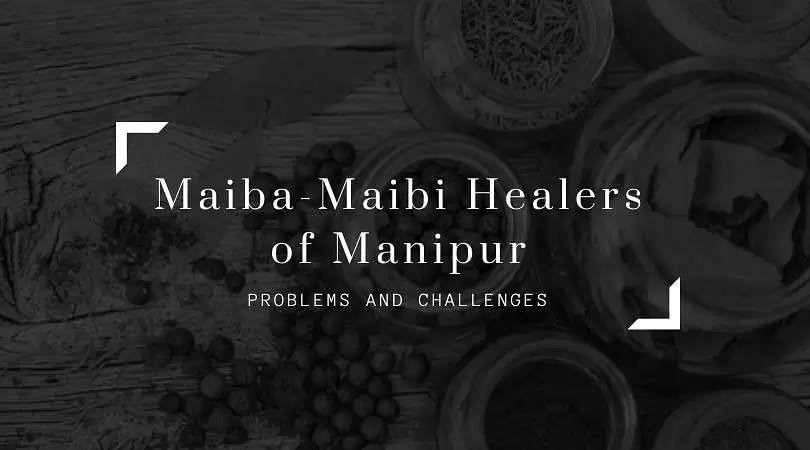Maiba-Maibi Healers of Manipur: Understanding their problems

IMPHAL | Oct 27:
With an aim to recognise the importance of indigenous healers and their knowledge systems, a two-day interactive sessions with Maiba-Maibi (local male and female healers) was held October 24-15 in the 'Traditional Healing Centres' in Imphal West and Imphal East Districts of Manipur.
The main objectives of the interactive sessions were to discuss the problems faced by the local healers, to recognise the importance of indigenous healers and their knowledge systems, the challenges faced by the healers such as dwindling flora, fauna and mineral resources, the challenge in knowledge transmission, challenge of intellectual property rights to the healers, and their integration into mainstream healthcare.
The age-old traditional knowledge base of medicinal plants and herbal healing systems, custodians are the Maiba and Maibi and other folk healers in Manipur.
ALSO READ | FEATURE | Slow Food Movement: Bringing communities together
Unlike AYUSH which follows acodified system, traditional healers are not integrated into the system. Thelatter follows a non-codified system bypassing on their knowledge through oral traditions and learning hands-onpractices. Therefore it is pertinent to question how they can be integratedinto the system. The hierarchical structure of healthcare makes it all the more challenging and difficult for integration. Despite all these challengesposed, efforts are being made such as North Eastern Institute of Folk Medicine (NEIFM),The Foundation for Revitalisation of Local Health Traditions (FRLHT) and therole played by Quality Control of India (QCI) to certify the healers across thecountry.
The healers raised some important underlying issues as to what can the state do with respect to the huge contribution by the traditional healers in providing health care at the primary level? How does each state see the health of its people and relate to the nature and preservation or conservation of the environment? The Maiba and Maibi also pointed out the danger of the dwindling away of traditional knowledge by the influence of development and modernity.

Another issue brought up is the smuggling of this knowledge out of the country and being patented abroad. There have been experiences where officials from state or AYUSH would come and document but never get back to the traditional healers after collecting the materials. Many times the traditional healers were invited to showcase their practice, but beyond that, they were seldom contacted for any benefit-sharing which was one of the main concerns of the healers.
ALSO WATCH:
However, the Bio-diversity Act clearly talks about benefit sharing and intellectual property rights, where if any new innovations are being made, it should be shared with the community. Patenting should also be in their name along with other stakeholders.
Asem Tomba, Assistant Professor, Department of Sociology, School of Social Sciences, SRM University Sikkim explained the main aim of organizing this type of interactive sessions which is to recognize the contribution of traditional healers to public health, the need to restore their respect, dignity and recognition and support them to run their services more efficiently. Some traditional healers suggested the provision of simple tools or small support from the state, such as building their herbal garden, healer's hut at panchayat level.
Many times, they work free of cost and treat their patients out of passion and altruism. Some of the key questions he posed during the interactive sessions were the importance of traditional healers in the community, how each diverse ethnic group takes care of their health, what kind of expectations they have from the government especially in support of the healers.
ALSO READ | Mizoram folklore | A heart-breaking story behind Rih Dil Lake
The purpose of the interactive sessions was also to look at the problems and challenges of the healers and how their practice can be revived or revitalized, preserved and promoted by the state and the national bodies. He also spoke on the state resources in terms of flora and fauna and the medicinal plants and within this background how the traditional healers can be supported.
Maiba- Maibi used to treat by herbalmedicines and they are working very hard for community health services andpromotion for the disease-free andoverall well-being of the people. Maiba and Maibi use to treat Primary HealthCare treatments. Just as the modern healthcare treatments have a speciality; the Maiba-Maibi healthcaretreatments also have their own kind of specialitysuch as stone kidney treatments, bone-fractured, sprain injuries treatments intheir own field of specialists. Maiba-Maibi healthcare treatments also includecancer treatments through "Ching-gee Nachan" (a kind of centipede). Maiba andMaibis are surviving with the support and trust of the community.
Therefore, there is an urgentneed for scientists and traditional healers to work together to find compoundsfor anti-diabetic, anti-malarial. He alsotalked about the different Declarations which call for the protection ofindigenous people's rights. There are many casesof the clash between MultinationalCorporation and indigenous people's rights. He, therefore, stressed the needfor the traditional healers and scientist to work hand in hand.

















